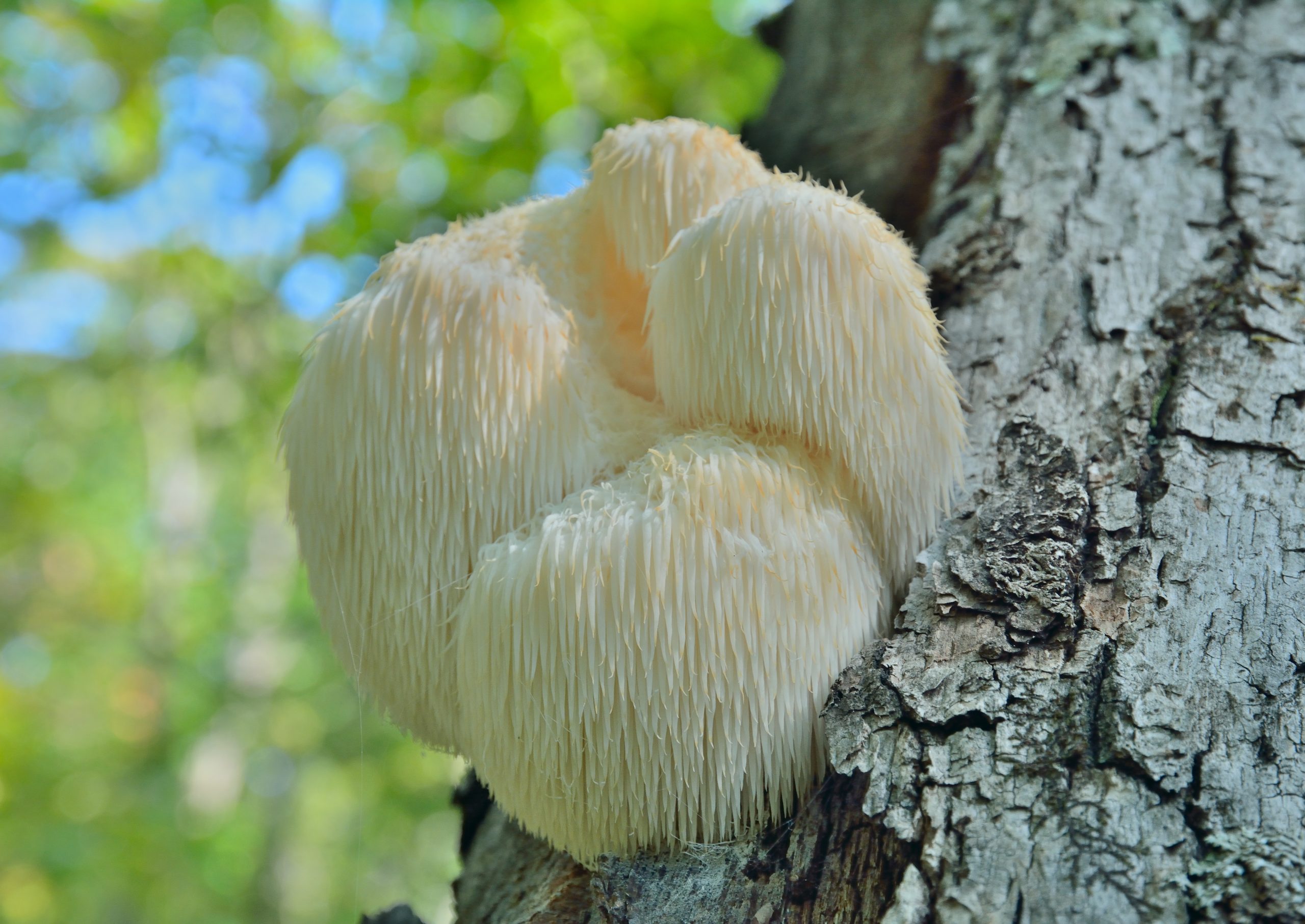Many diseases, such as cardiovascular diseases, type 2 diabetes, neurodegenerative diseases, and cancer have inflammation and oxidative stress as potential precursors. Lion’s mane (Hericium erinaceus, Hericiaceae) has been shown to enhance cognitive function, improve memory and concentration, and protect against neurodegenerative diseases. The bioactive components of lion’s mane are important in understanding the mechanism of action and potential neuroprotective properties.
Lion’s mane grows on dead or dying hardwood trees in temperate forests in North America, Europe, and Asia. Studies show that the chemical make-up of lion’s mane is affected by the cultivation and stage of fungal development. Lion’s mane is administered as teas, capsules, tablets, powder, liquid extract, functional beverages, and protein bars.
Lion’s mane is comprised of polysaccharides, terpenoids, phenolic compounds, and bioactive proteins. These compounds contribute to its antioxidant, anti-inflammatory, and neuroprotective activities. ß-glucans are the most studied compounds of lion’s mane and are shown to activate macrophages, natural killer cells, and T lymphocytes. Research demonstrates the immunomodulatory, antimicrobial, and antitumor effects.
The terpenoids in lion’s mane, hericenones, and erinacines have been attributed to the neurogenerative and neuroprotective properties. These compounds stimulate nerve growth factor, which makes them relevant for Alzheimer’s and Parkinson’s diseases. Hericenones and erinacines have also been shown to modulate key inflammatory pathways, including nuclear factor kappa B (NF-kB) and cyclooxygenase-2, which chronic systemic inflammation and neuroinflammation. Erinacines and hericenones inhibit phosphorylation of inhibitor of NF-kB, which prevents NF-kB activation, reducing the inflammatory process.
Lion’s mane also contains ergothioneine. This compound has potent antioxidant properties shown to neutralize reactive oxygen species and reduce oxidative stress in neuronal cells.
While most studies are in vitro or animal studies, several clinical trials evaluating the efficacy of lion’s mane cognitive function and gastrointestinal health have been done. One randomized, double-blind, placebo-controlled trial evaluated cognitive function in Japanese men and women aged 50 to 80 years who were diagnosed with mild cognitive impairment. Treatment included lion’s mane extract over 16 weeks compared to a placebo. Significant improvements were observed in the treatment group compared to the placebo.1
A systematic review from 2024 explored the cognitive and other benefits of lion’s mane mushroom, focusing on mood and neurocognitive benefits across the lifespan. The systematic evaluation was of epidemiological and clinical studies that investigated the role of mushrooms, either as a separate or integral dietary component, on neurocognition and mood. Following a search of four databases, a total of 34 human studies examining the effect of different mushrooms across varying age cohorts and health statuses were selected for inclusion. There were 24 epidemiological studies in this review which revealed a significant benefit of dietary patterns that included mushrooms of any species on cognition and mood in both healthy and compromised populations. However, the 10 intervention studies were mixed. Studies mainly investigated lion’s mane (Hericium erinaceus), showing some enhancement of mood and cognitive function in middle-aged and older adults.2
A previous systematic review published in 2023 found significant improvements in cognitive function and reductions in anxiety and depression symptoms. The review covered 16 dietary ingredients that included lion’s mane. Lion’s mane demonstrated potential benefits in cognition, mood, perceived feelings, sleep, and mental energy.3
Another systematic review published in 2024 encompassed a range of studies, including human clinical trials (in vivo) and preclinical trials conducted on cell lines (in vitro), humans, and animals. General findings included remarkable potential to enhance cognitive function, mitigate inflammation, and bolster antioxidant defenses.4
References:
1. Mori K, Inatomi S, Ouchi K, et al. Improving effects of the mushroom Yamabushitake (Hericium erinaceus) on mild cognitive impairment: a double-blind placebo-controlled clinical trial. Phytother Res 2009;Mar; 23(3):367-72.
2. Cha S, Bell L, Shukitt-Hale B, Williams C. A review of the effects of mushrooms on mood and neurocognitive health across the lifespan. Neurosci Biobehav Rev; 2024 Mar:158:105548
3. Neiman, K, Zhu Y, Tucker M, Koecher K. The Role of Dietary Ingredients in Mental Energy – A Scoping Review of Randomized Controlled Trials. Journal of the American Nutrition Association 2024, Vol. 43, no. 2, 167–182).
4. Opanuga IO, Hossain MF. Exploring the Cognitive and Other Unique Health Benefits of Lion’s Mane Mushroom: A Systematic Review. Am J Nat Med Facts. 2024;1(3):1-6.
Additional Resources:
· Contato AG, Conte-Junior CA. Lion’s mane mushroom (Hericium erinaceus): A neuroprotective fungus with antioxidant, anti-inflammatory, and antimicrobial potential—a narrative review. Nutrients. April 2025;17(8):1307. doi: 10.3390/nu1781307
· Szucko-Kociuba I, Trzeciak-Ryczek A, Kupnicka P, et al. Neurotrophic and Neuroprotective Effects of Hericium erinaceus. Int. J. Mol. Sci. 2023, 24(21)



